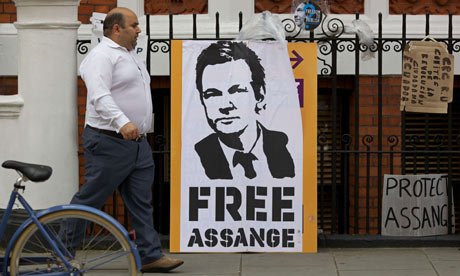
Ecuador has granted asylum to WikiLeaks founder Julian Assange two months after he took refuge in country’s London embassy while fighting extradition from the UK.
It said there were fears Julian Assange’s human rights might be violated.
Ecuadorian foreign minister Ricardo Patino accused the UK of making an “open threat” to enter its embassy to arrest him.
Julian Assange took refuge at the embassy in June to avoid extradition to Sweden, where he faces questioning over assault and rape claims, which he denies.
The Foreign Office said the decision on Julian Assange’s application for political asylum would not affect the UK’s legal obligation to extradite him to Sweden.
It tweeted: “We remain committed to a negotiated solution that allows us to carry out our obligations under the Extradition Act.”

The UK government will still seek to arrest him and it will not grant him safe passage. If he steps out, he will be arrested.
Announcing Ecuador’s decision, Ricardo Patino said the country believed Julian Assange’s fears of political persecution were “legitimate”.
He said the country was being loyal to its tradition of protecting those who were vulnerable.
“We trust that our friendship with the United Kingdom will remain intact,” he added.
The announcement was watched live by Julian Assange and embassy staff in a link to a press conference from Quito.
Outside Ecuador’s embassy in London, news was slowly spreading through Julian Assange’s assembled supporters and they were delighted.
“The political temperature has risen very significantly. It is clear this is only the beginning of a very long legal contest,” he said.
There was now a “complete standoff” between the UK and Ecuador regarding the status of the embassy in London.
The British government now had to make a decision, adding that the risks were enormous – including making other embassies around the world vulnerable.
Julian Assange entered the embassy after the UK’s Supreme Court dismissed the Australian national’s bid to reopen his appeal against extradition and gave him a two-week grace period before extradition proceedings could start.
It was during that fortnight, while on bail, that he sought refuge.
A subsequent offer by Ecuador to allow Swedish investigators to interview Julian Assange inside the embassy was rejected.
The WikiLeaks website Julian Assange founded published a mass of leaked diplomatic cables that embarrassed several governments, particularly the US’s, in 2010.
Earlier, the UK Foreign Office warned it could lift the embassy’s diplomatic status to fulfill a “legal obligation” to extradite the 41-year-old by using the Diplomatic and Consular Premises Act 1987.
That allows the UK to revoke the diplomatic status of an embassy on UK soil, which would potentially allow police to enter the building to arrest Julian Assange for breaching the terms of his bail.
Julian Assange says he fears that if extradited to Sweden, he will then be passed on to the American authorities.
In 2010, two female ex-WikiLeaks volunteers accused Julian Assange, an Australian citizen, of committing sexual offences against them while he was in Stockholm to give a lecture.
Julian Assange claims the sex was consensual and the allegations are politically motivated.